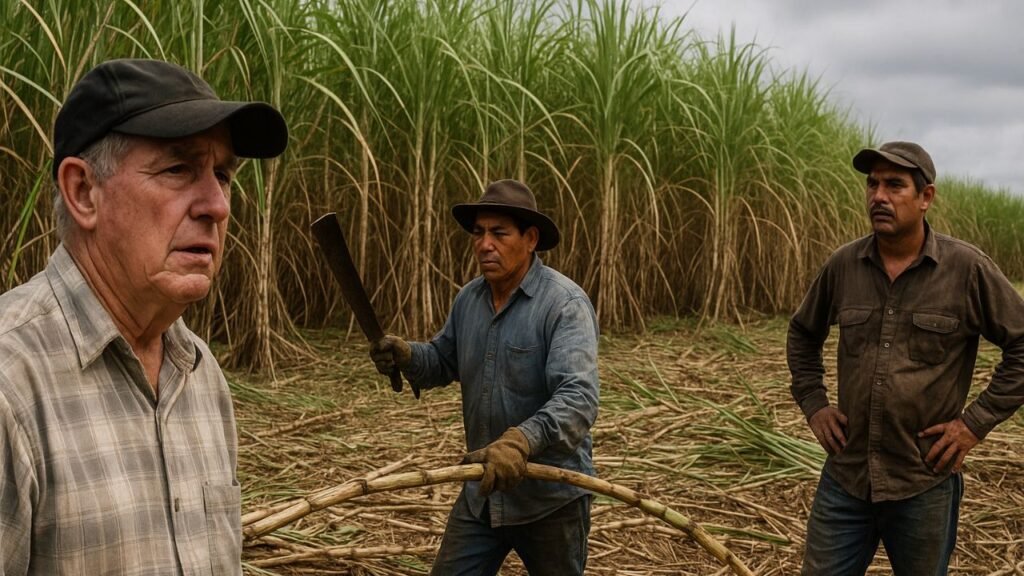Double Whammy – The South African sugar industry is facing unprecedented challenges as farmers grapple with the dual pressures of U.S. tariffs and a surge of cheap imported sugar flooding local markets. Domestic producers, already operating on thin profit margins, now face declining revenues due to international trade barriers combined with an influx of lower-priced sugar from countries like Brazil and India. The tariffs imposed by the United States on certain sugar exports have not only disrupted traditional trade routes but also reduced potential markets for South African sugar, limiting growth opportunities for farmers. According to industry analysts, local sugar mills are struggling to remain competitive while maintaining operational costs, which include labor, transportation, and production expenses. The economic impact is significant, affecting not only farm owners but also thousands of workers employed in sugarcane harvesting and processing. Farmers and industry associations are urging the government to negotiate better trade deals and implement protective policies to shield the sector from further decline. For further details on international trade dynamics, refer to Reuters on sugar market volatility.

Impact of U.S. Tariffs on South African Sugar Exports
U.S. tariffs have created a direct obstacle for South African sugar exports, reducing the competitive advantage of local producers. These tariffs, which were primarily aimed at leveling trade between U.S. producers and foreign exporters, inadvertently impacted South African farmers who rely on global markets to sustain revenue streams. Exporters report that some U.S. buyers are switching to alternative suppliers, leaving South African sugar struggling to secure contracts abroad. The South African Sugar Association (SASA) has highlighted that the tariff imposition has led to a decline in export volumes, which has further strained the industry financially. Experts suggest that, without intervention, small-scale farmers may be forced out of the market entirely, resulting in job losses and reduced rural economic activity. The challenge is compounded by fluctuating international sugar prices, which remain low due to oversupply from major producers in South America and Asia. Farmers are increasingly dependent on government support and strategic trade negotiations to mitigate the adverse effects of these tariffs. More information on the economic consequences can be found at USDA Sugar Annual Report.
Cheap Imports Flooding Domestic Markets
In addition to tariffs, South African sugar producers are contending with an influx of cheap imported sugar, primarily from countries benefiting from lower production costs. These imports have intensified competition in local markets, forcing domestic producers to sell at reduced prices, which often fails to cover production costs. The phenomenon has placed immense financial pressure on farmers who are already dealing with rising operational expenses and limited access to affordable financing. Analysts note that cheap sugar imports disrupt market equilibrium, affecting the profitability of mills and farm sustainability. This situation not only threatens the livelihoods of farmers but also poses risks to the broader agro-economy, including supply chain operators, transporters, and local retailers. Government authorities have acknowledged the issue and are reportedly exploring measures such as import quotas, tariffs, or incentives for local production to stabilize prices. For insights into import challenges and market effects, refer to Business Live on sugar imports.
Economic Implications for Rural Communities
The downturn in the sugar industry has far-reaching implications for rural communities, where sugarcane farming constitutes a primary source of income. As prices drop and revenue streams shrink, farmers may struggle to maintain employment levels, potentially leading to widespread job losses. Rural households, often dependent on sugar farming, could face financial insecurity, reduced access to essential services, and decreased educational opportunities for children. Local economies are further affected as decreased spending power impacts small businesses and service providers in farming regions. Agricultural unions and cooperative groups are urging for immediate government intervention, including subsidies, trade protection measures, and financial relief packages to prevent economic collapse in these communities. This crisis underscores the critical need for diversified rural economic planning, which can reduce vulnerability to international market fluctuations. Learn more about socio-economic impacts at World Bank Agriculture Overview.
 Historic Win at Lord’s: Temba Bavuma Leads SA to First Bilateral ODI Series Victory in 27 Years
Historic Win at Lord’s: Temba Bavuma Leads SA to First Bilateral ODI Series Victory in 27 Years
Potential Solutions and Industry Strategies
To combat the dual threats of U.S. tariffs and cheap imports, industry stakeholders are exploring multiple strategies. These include lobbying for revised trade agreements, enhancing production efficiency, investing in mechanization, and diversifying product lines to include higher-value sugar derivatives. Some farmers are considering vertical integration, developing partnerships with local food and beverage companies to secure stable domestic demand. Additionally, advocacy groups are pushing for government policies that provide financial support, price stabilization mechanisms, and import regulation enforcement. By implementing these measures, the industry hopes to regain competitiveness, protect jobs, and ensure sustainable growth in the long term. The strategic importance of sugar extends beyond the farm, influencing rural development, employment, and the national economy. For more information on strategic interventions, see FAO Sustainable Agriculture Initiatives.




